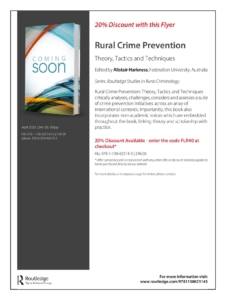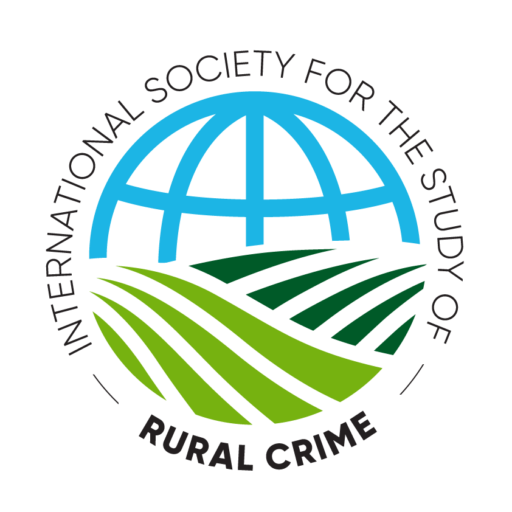ISSRC Blog
This blog provides an opportunity for pithy observations or reflections on topical rural crime news and developments, a summary of research, promotion of publications, advertisements for upcoming events… and more! If you would like to contribute, email a submission of no more than 500 words to admin@issrc.net
New book – “Rural Crime Prevention”
A new book entitled Rural Crime Prevention: Theory, Tactics and Techniques, edited by our Secretary Alistair Harkness, will be published in April 2020 by Routledge. The book brings toghether 20 academic chapters and 12 practitioner perspectives, and critically analyses, challenges, considers and assesses a suite of crime prevention initiatives across an array of international contexts.
This book recognises the diversity and distinct features of rural places and the ways that these elements impact on rates, experiences and responses. Crucially, Rural Crime Prevention also incorporates non-academic voices which are embedded throughout the book, linking theory and scholarship with practice.
Proactive responses to rural offending based on sound evidence can serve to facilitate feelings of safety and security throughout communities, enhance individual wellbeing and alleviate pressure on the overburdened and typically under-resourced formal elements of the criminal justice system. This book provides an opportunity to focus on the prevention of crime in regional, rural and remote parts of the globe.

An accessible and compelling read, this book will appeal to students and scholars of criminology, policing, sociology and practitioners interested in learning about the best-practice international approaches to rural crime prevention in the twenty-first century.
Pre-orders are availble via the Routledge website, and a 20 percent discount is offered if using the code in this flier: authorflyerbeforepub
Centre for Rural Criminology at the University of New England, Australia
The Centre for Rural Criminology is based at the University of New England in Armidale, New South Wales, Australia.
The Centre is looking to expand its membership, and is also seeking expressions of interest for leaders of its five key thematic research areas:
- Policing, Justice and Rurality
- Criminological Dimensions of Food and Agriculture
- Drug Use, Production and Trafficking in the Rural Context
- Violence and Rurality
- Environment, Climate and Crime.
If you are interested in joining the Centre as a member or as a theme leader, provide your details and a brief description of your research focus to the Secretary, Jenny Wise at rucrim@une.edu.au.
Further details on membership can be found here: RuCrim call for members
